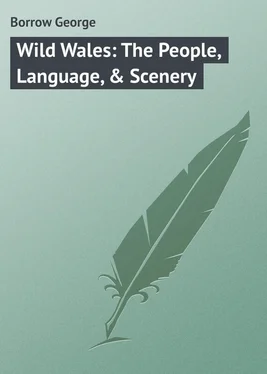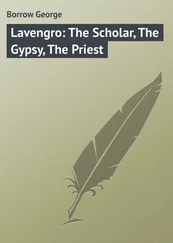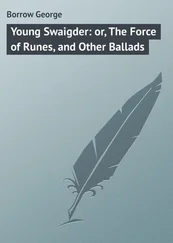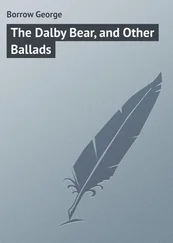George Borrow - Wild Wales - The People, Language, & Scenery
Здесь есть возможность читать онлайн «George Borrow - Wild Wales - The People, Language, & Scenery» — ознакомительный отрывок электронной книги совершенно бесплатно, а после прочтения отрывка купить полную версию. В некоторых случаях можно слушать аудио, скачать через торрент в формате fb2 и присутствует краткое содержание. Жанр: foreign_prose, Путешествия и география, на английском языке. Описание произведения, (предисловие) а так же отзывы посетителей доступны на портале библиотеки ЛибКат.
- Название:Wild Wales: The People, Language, & Scenery
- Автор:
- Жанр:
- Год:неизвестен
- ISBN:нет данных
- Рейтинг книги:5 / 5. Голосов: 1
-
Избранное:Добавить в избранное
- Отзывы:
-
Ваша оценка:
- 100
- 1
- 2
- 3
- 4
- 5
Wild Wales: The People, Language, & Scenery: краткое содержание, описание и аннотация
Предлагаем к чтению аннотацию, описание, краткое содержание или предисловие (зависит от того, что написал сам автор книги «Wild Wales: The People, Language, & Scenery»). Если вы не нашли необходимую информацию о книге — напишите в комментариях, мы постараемся отыскать её.
Wild Wales: The People, Language, & Scenery — читать онлайн ознакомительный отрывок
Ниже представлен текст книги, разбитый по страницам. Система сохранения места последней прочитанной страницы, позволяет с удобством читать онлайн бесплатно книгу «Wild Wales: The People, Language, & Scenery», без необходимости каждый раз заново искать на чём Вы остановились. Поставьте закладку, и сможете в любой момент перейти на страницу, на которой закончили чтение.
Интервал:
Закладка:
“I have brought my husband to visit you,” said my wife, addressing herself to him.
“I am most happy to see him,” said the old gentleman, making me a polite bow.
He then begged that we would do him the honour to walk into his parlour, and led us into a little back room, the window of which looked out upon the Dee a few yards below the bridge. On the left side of the room was a large case, well stored with books. He offered us chairs, and we all sat down. I was much struck with the old man. He was rather tall, and somewhat inclined to corpulency. His hair was grey; his forehead high; his nose aquiline; his eyes full of intelligence; whilst his manners were those of a perfect gentleman. I entered into conversation by saying that I supposed his name was Jones, as I had observed that name over the door.
“Jones is the name I bear at your service, sir,” he replied.
I said that it was a very common name in Wales, as I knew several people who bore it, and observed that most of the surnames in Wales appeared to be modifications of Christian names; for example Jones, Roberts, Edwards, Humphreys, and likewise Pugh, Powel, and Probert, which were nothing more than the son of Hugh, the son of Howel, and the son of Robert. He said I was right, that there were very few real surnames in Wales; that the three great families, however, had real surnames; for that Wynn, Morgan, and Bulkley were all real surnames. I asked him whether the Bulkleys of Anglesea were not originally an English family. He said they were, and that they settled down in Anglesea in the time of Elizabeth.
After some minutes my wife got up and left us. The old gentleman and I had then some discourse in Welsh; we soon, however, resumed speaking English. We got on the subject of Welsh bards, and after a good deal of discourse the old gentleman said:
“You seem to know something about Welsh poetry; can you tell me who wrote the following line?
“‘There will be great doings in Britain, and I shall have no concern in them.’”
“I will not be positive,” said I, “but I think from its tone and tenor that it was composed by Merddyn, whom my countrymen call Merlin.”
“I believe you are right,” said the old gentleman, “I see you know something of Welsh poetry. I met the line, a long time ago, in a Welsh grammar. It then made a great impression upon me and of late it has always been ringing in my ears. I love Britain. Britain has just engaged in a war with a mighty country, and I am apprehensive of the consequences. I am old, upwards of fourscore, and shall probably not live to see the evil, if evil happens, as I fear it will – ‘There will be strange doings in Britain, but they will not concern me.’ I cannot get the line out of my head.”
I told him that the line probably related to the progress of the Saxons in Britain, but that I did not wonder that it made an impression upon him at the present moment. I said, however, that we ran no risk from Russia; that the only power at all dangerous to Britain was France, which though at present leagued with her against Russia, would eventually go to war with and strive to subdue her, and then of course Britain could expect no help from Russia, her old friend and ally, who, if Britain had not outraged her, would have assisted her, in any quarrel or danger, with four or five hundred thousand men. I said that I hoped neither he nor I should see a French invasion, but I had no doubt one would eventually take place, and that then Britain must fight stoutly, as she had no one to expect help from but herself; that I wished she might be able to hold her own, but —
“Strange things will happen in Britain, though they will concern me nothing,” said the old gentleman with a sigh.
On my expressing a desire to know something of his history, he told me that he was the son of a small farmer, who resided at some distance from Llangollen; that he lost his father at an early age, and was obliged to work hard, even when a child, in order to assist his mother who had some difficulty, after the death of his father, in keeping things together; that though he was obliged to work hard he had been fond of study, and used to pore over Welsh and English books by the glimmering light of the turf fire at night, for that his mother could not afford to allow him anything in the shape of a candle to read by; that at his mother’s death he left rural labour, and coming to Llangollen, commenced business in the little shop in which he was at present; that he had been married and had children, but that his wife and family were dead; that the young woman whom I had seen in the shop, and who took care of his house, was a relation of his wife; that though he had always been attentive to business, he had never abandoned study; that he had mastered his own language, of which he was passionately fond, and had acquired a good knowledge of English and of some other languages. That his fondness for literature had shortly after his arrival at Llangollen attracted the notice of some of the people, who encouraged him in his studies, and assisted him by giving him books; that the two celebrated ladies of Llangollen had particularly noticed him; that he held the situation of church clerk for upwards of forty years, and that it was chiefly owing to the recommendation of the “great ladies” that he had obtained it. He then added with a sigh, that about ten years ago he was obliged to give it up, owing to something the matter with his eyesight, which prevented him from reading, and that his being obliged to give it up was a source of bitter grief to him, as he had always considered it a high honour to be permitted to assist in the service of the Church of England, in the principles of which he had been bred, and in whose doctrines he firmly believed.
Here shaking him by the hand I said that I too had been bred up in the principles of the Church of England; that I too firmly believed in its doctrines, and would maintain with my blood, if necessary, that there was not such another church in the world.
“So would I,” said the old gentleman; “where is there a church in whose liturgy there is so much Scripture as in that of the Church of England?”
“Pity,” said I, “that so many traitors have lately sprung up in its ministry.”
“If it be so,” said the old church clerk, “they have not yet shown themselves in the pulpit at Llangollen. All the clergymen who have held the living in my time have been excellent. The present incumbent is a model of a Church-of-England clergyman. O, how I regret that the state of my eyes prevents me from officiating as clerk beneath him.”
I told him that I should never from the appearance of his eyes have imagined that they were not excellent ones.
“I can see to walk about with them, and to distinguish objects,” said the old gentleman; “but see to read with them I cannot. Even with the help of the most powerful glasses I cannot distinguish a letter. I believe I strained my eyes at a very early age, when striving to read at night by the glimmer of the turf fire in my poor mother’s chimney corner. O what an affliction is this state of my eyes! I can’t turn my books to any account, nor read the newspapers; but I repeat that I chiefly lament it because it prevents me from officiating as under preacher.”
He showed me his books. Seeing amongst them The Fables of Yriarte in Spanish, I asked how they came into his possession.
“They were presented to me,” said he, “by one of the ladies of Llangollen, Lady Eleanor Butler.”
“Have you ever read them?” said I.
“No,” he replied; “I do not understand a word of Spanish; but I suppose her ladyship, knowing I was fond of languages, thought that I might one day set about learning Spanish, and that then they might be useful to me.”
Читать дальшеИнтервал:
Закладка:
Похожие книги на «Wild Wales: The People, Language, & Scenery»
Представляем Вашему вниманию похожие книги на «Wild Wales: The People, Language, & Scenery» списком для выбора. Мы отобрали схожую по названию и смыслу литературу в надежде предоставить читателям больше вариантов отыскать новые, интересные, ещё непрочитанные произведения.
Обсуждение, отзывы о книге «Wild Wales: The People, Language, & Scenery» и просто собственные мнения читателей. Оставьте ваши комментарии, напишите, что Вы думаете о произведении, его смысле или главных героях. Укажите что конкретно понравилось, а что нет, и почему Вы так считаете.












